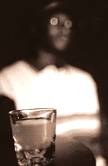New Treatment Shows Promise for Excessive Drinking
Boosting brain protein in animal study cut desire, relapse in as little as 10 minutes.
|
E-mail this article
Subscribe to news
Printer friendly version
|

(SOURCE: University of California, San Francisco, news release, June 9, 2008)
TUESDAY, June 10 (HealthDay News) -- A new treatment that reduces excessive drinking and prevents drinking relapse proved successful in tests on rats, a new study finds.
The treatment involves increasing levels of a brain protein called glial cell-derived neurotrophic factor (GDNF) -- also being looked at as a treatment for Parkinson's disease.
The researchers also pinpointed the site in the brain where GDNF acts to control drinking.
In addition, the treatment didn't block other normal pleasure-seeking behaviors (such as craving sweets), a common problem with drugs developed to treat alcoholism.
In this study, rats were conditioned for two months to seek alcohol. The researchers then injected GDNF into a brain region called the Ventral Tegmental Area (VTA), which is believed to be strongly involved in drug-seeking behavior. The rats' desire to drink alcohol decreased significantly within as little as 10 minutes, and the effect lasted at least three hours.
But the rats still wanted to drink sugar water after the injections of GDNF, which shows that increased levels of GDNF didn't decrease this pleasure-seeking behavior.
In another part of the study, the researchers trained rats to desire alcohol and then took it away from them. When alcohol was reintroduced, the rats started drinking the same amount as before. But when they were treated with GDNF, they lost their taste for alcohol.
The study was published in this week's issue of the Proceedings of the National Academy of Sciences.
"Alcoholism is a devastating and costly psychiatric disease with enormous socioeconomic impact. There is tremendous need for therapies to treat alcohol abuse," study senior author Dorit Ron, principal investigator at the University of California, San Francisco-affiliated Ernest Gallo Clinic and Research Center, said in a prepared statement.
"Unfortunately, only three drugs are currently approved to treat excessive drinking, and all have serious limitations. Our findings open the door to a promising new strategy to combat alcohol abuse, addiction and especially relapse," Ron said.
More information
The American Psychological Association has more about alcohol use disorders and their treatment. 
Copyright © 2008 ScoutNews, LLC. All rights reserved. 
HealthDayNews articles are derived from various sources and do not reflect federal policy. healthfinder.gov does not endorse opinions, products, or services that may appear in news stories. For more information on health topics in the news, visit the healthfinder.gov health library.